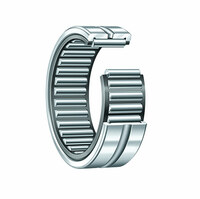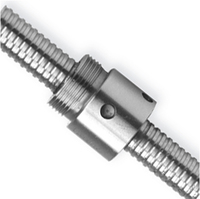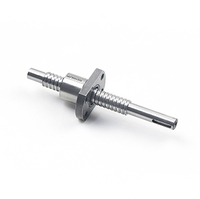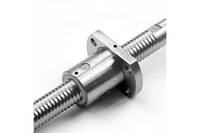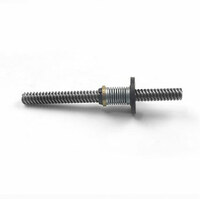Needle Roller Bearings
Specifications
Needle roller bearings use needle rollers as their rolling elements rather than balls. The term "needle roller" usually means that its length is several times its diameter.
small needle roller bearings have a smaller cross-sectional height and could keep the entire machine lighter and more compact, thus maintaining a relatively high load carrying capacity. The key
components are the cage (also known as the separator or support) and the roller bearing needle rollers.
Needle roller and cage assembly can be mounted directly as a stand-alone accessory, or cam roller bearings can be used in conjunction with other parts, inner and outer rings, to form complete
needle roller bearings that can be used as stand-alone bearing support mounts.
Needle Roller Bearing Advantages
solid needle roller bearings, developed by THB, as one of the most professional needle roller manufacturers in China, have the following advantages:
Because of the small radial cross section of needle roller bearings, they are very suitable for working conditions where the mounting space is small
Optimized needle roller and raceway shape design, so that the bearing has a higher radial load capacity
High precision needle roller bearings can obtain high running accuracy
Needle Roller Bearing Types
The rolling elements in needle roller bearings are cylindrical rollers, which are very thin (the length of the rollers is 3-10 times the diameter, and the diameter is usually less than 5mm), so the
radial structure is compact. With the same bore diameter and load carrying capacity as other types of bearings, its radial cross section is the smallest, making it particularly suitable for shaft
designs with limited radial mounting dimensions. Needle roller bearings without inner rings or complete needle rollers with cage can be selected for various applications. At the same time, the
surface of the journal and the surface of the bore that match with the bearing are directly used as the inner and outer rolling surfaces of the bearing. In order to achieve load carrying capacity
and performance equivalent to bearings with raceways, the surface hardness of the raceways, the machining accuracy and the surface quality of shafts and housing bores must be the same as those of
bearings with rings. This type of bearing can only support radial loads.
Generally speaking, needle roller bearings are divided into several types, such as needle rollers and cages, drawn cup needle roller bearings, machined needle roller bearings, compound needle
roller bearings, etc.
The Installation of Needle Roller Bearing
The installation of full complement needle roller bearings is usually carried out using auxiliary sleeves. At this time, the auxiliary roller or auxiliary sleeve supports the needle roller to
prevent it from falling out, and the journal raises the needle roller with its own chamfer. As the needle bearing moves inward on the journal, the auxiliary roller or the auxiliary sleeve will
withdraw slowly until it is installed in the working position.
The outer diameter of the auxiliary roller and auxiliary sleeve should be 0.1-0.3mm smaller than the shaft diameter. When installing, first coat the inner surface of the bearing outer ring with
grease, stick the needle roller close to the inner surface (there should be a gap when inserting the last needle), and then use the auxiliary roller instead of the journal or inner ring of the
bearing. Or push the auxiliary sleeve into the inscribed circle composed of needle rollers, and align its end face with the end face of the mounting shaft or the end face of the inner ring of the
bearing that has been installed on the shaft, and then tap it with a press or a hand hammer to apply pressure.
nta 1625 needle thrust bearing can also be installed in this way, that is, apply a thin layer of lubricating oil to the outer diameter of the auxiliary sleeve and insert it into the outer ring of
the bearing, so that the outer diameter of the auxiliary sleeve and the outer ring raceway of the bearing form an annular space, and then install needle rollers in the annular space. After the
needle roller is installed, use the working shaft to push out the auxiliary sleeve.
For needle roller bearings without inner ring or outer ring, during installation, first apply a thin layer of grease to the rolling surface of the shaft or housing hole, and place the needles on
the grease at the installation site in turn. There should be a gap when placing the last needle.
On the circumference of the nkis 20 bearing , it is not advisable to squeeze the last needle in, or miss one needle, because the bearing will be stuck and unable to rotate during hard squeezing;
when there is needles missing, the gap will be too large, which will easily cause the needle rollers to twist and break when the it is running. For needle roller bearings with a stamped outer ring,
they are not allowed to be hammered and installed because of the extremely thin outer ring wall, and the needles should be pressed in by pressing machine. Because the pressure is uneven when
hitting by the hand hammer, it is easy to cause locally deformation of the outer ring of the needle roller bearing.
If you need any kinds of linear motion control systems, please contact us, as a professional linear motion manufacturer, VXO is willing to offer you high quality products.
- Country: China (Mainland)
- Business Type: Manufacturer
- Founded Year: 2011
- Address: 5/F, Bldg. B, Baodai Sci-Tech Park, 988 Wusong Road,Wuzhong Dist, Suzhou, Jiangsu
- Contact: vxolinear motion

